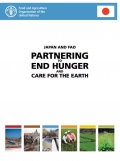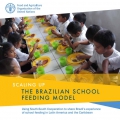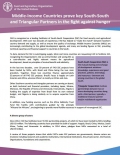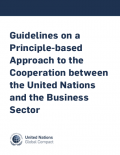文件

Resource Partners
13 Jul 2015
For several decades, Japan has been among the Food and Agriculture Organization of the United Nations’ (FAO) foremost partners in feeding the hungry and caring for the earth. The country ranks second in assessed contributions to FAO’s regular budget, and fourth in terms of voluntary contributions in 2012-2013. It is also among the top contributors to the 2 500 ongoing field programmes, with a total value of nearly USD 800 million. It also provides expertise in the fields of agriculture, fisheries and forestry, contributing valuable human resources to various FAO projects.
South-south Cooperation
15 Jun 2015
Brazil has made tremendous progress in reducing malnutrition. In 1990, 14.8 percent of the population suffered from hunger; the figure is now just 1.7 percent. This remarkable transformation owes much to the country’s school feeding programme. By 2014, the programme was supplying approximately 43 million pupils with one or more servings of food per day, in almost 250 000 schools across the country. By Brazilian law, at least 30 percent of the food must be sourced from family farms, thus providing significant benefits to over 120 000 rural families. 
South-south Cooperation
09 Feb 2015
Under the Nigeria-China SSC programme, which is facilitated by FAO, nearly 700 Chinese experts have been deployed to Nigeria since 2003, with assignments of two years or more. These experts have been introducing new technologies, exchanging best practices and sharing knowledge and experiences with their Nigerian counterparts in technical areas such as irrigation, crop production, livestock production, aquaculture and apiculture. 
South-south Cooperation
12 Jan 2015
FAO is recognized as a leading facilitator of South-South Cooperation (SSC) for food security and agricultural development. With over two decades of experience, FAO has helped to “make the match” between Southern country demand and supply, as well as ensure the quality of exchange. Middle Income Countries (MICs) are increasingly contributing to the global development agenda, and many are leading figures in SSC, providing technical expertise and financial support to countries in the South.
Private Sector
01 Jan 2015
Author: United Nations Global CompactInitially developed in 2000 as a common framework for UN-Business collaboration, the Guidelines apply to the UN Secretariat as well as separately administered organs, Funds and Programmes. The Guidelines, developed in 2000, revised and reissued in 2009, and further revised in 2015, provided a framework on a common and systemic approach to partnerships between the Organization and the business sector, placing greater emphasis on transparency, coherence, impact, accountability and due diligence.
